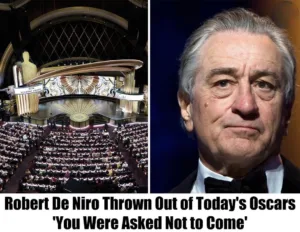
In a seismic event that has reverberated through Tinseltown and beyond, iconic actor Robert De Niro found himself escorted out of today’s Oscars venue. The cause behind this unprecedented action? A succinct yet potent statement from event organizers: “Your presence was not desired.”
Robert De Niro, a titan of the silver screen whose illustrious career spans more than half a century, is no stranger to the glitz and glamour of the Academy Awards. With two golden statuettes adorning his shelf and numerous nominations, De Niro’s imprint on cinema is indelible. However, today’s occurrence paints a vastly different tableau, one that poses inquiries about the boundaries of stardom, the sanctity of esteemed gatherings such as the Oscars, and the intricate interplay between individual expression and public etiquette.
The lead-up to today’s Oscars unfolded much like any other, brimming with anticipation, prognostications, and the promise of cinematic jubilation. The crimson carpet unfurled, the luminaries prepared to dazzle, and the world tuned in. Yet, beneath the surface simmered a tension, a harbinger of what would transpire as one of the most sensational moments in Oscars annals.
De Niro’s attendance at the gala was, predictably, a foregone conclusion. However, clandestine dialogues and decisions behind closed doors culminated in a categorical directive from the Oscars organizers to the esteemed thespian: his presence was unwelcome. The rationales underpinning this injunction remain cloaked in ambiguity and conjecture. Was it a mere miscommunication, a scheduling clash, or perchance something more profound tied to De Niro’s vocal political stances or recent controversies? The specifics may elude us, but the denouement was unequivocal.
As attendees streamed in and the ceremony commenced, the unthinkable unfolded. Robert De Niro, despite the admonitions, made his ingress to the Oscars, only to be intercepted and subsequently ejected from the premises. The moment was surreal, a tableau that seemed plucked from a celluloid melodrama rather than reality. “Your presence was not desired,” the refrain echoed, delineating a line in the sand by the Oscars organizers.
The decision to physically oust De Niro not only disrupted the proceedings but also ignited a conflagration of media scrutiny and public discourse. Advocates of De Niro lambasted the move as an infringement upon freedom of expression, contending that an artist of his stature merited a place at the Oscars, irrespective of any behind-the-scenes discord. Detractors, conversely, viewed the organizers’ stance as a necessary assertion in upholding the integrity and decorum of the event, positing that no individual, regardless of their cinematic accolades, transcends the collective ethos of the Oscars.
The ramifications of the incident are labyrinthine, mirroring the multifaceted interplay between celebrity culture, the sanctity of institutions like the Oscars, and the broader societal mores governing conduct in public and private domains. Robert De Niro’s ejection from the Oscars serves as a fulcrum for dialogues about the expectations foisted upon public figures, the boundaries of personal expression in formal settings, and the obligations of event organizers to uphold certain standards.